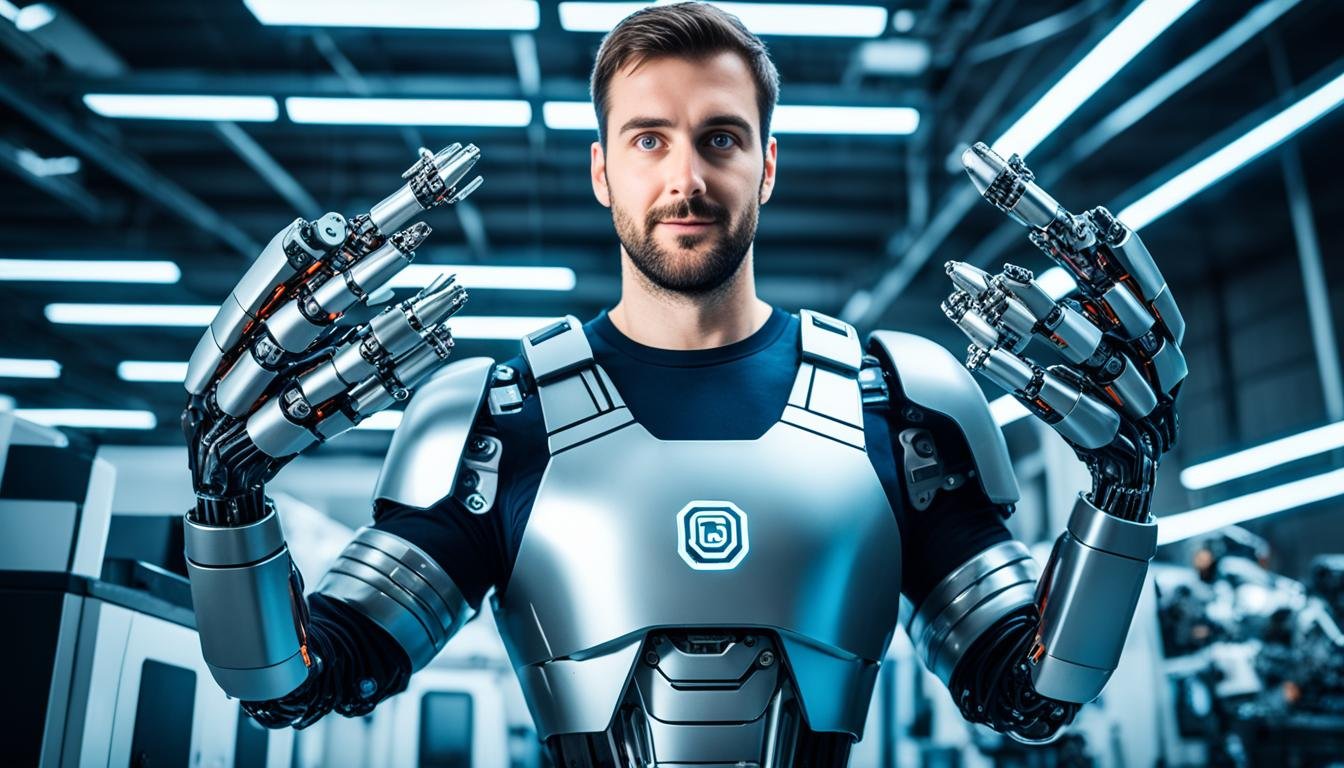AI is getting more advanced, making people wonder if it will replace mechanical engineers. AI is great at doing repetitive tasks, like making 2D and 3D models in mechanical design. But, it’s not likely to take over the job of mechanical engineers completely.
Instead, AI will likely make mechanical engineers more in demand. They will be needed to work with these technologies and make sure they fit into the design process well.
AI is changing manufacturing by making some jobs easier, which has raised worries about job losses. But, a report from the World Economic Forum in 2020 says that AI will create more new jobs than it will replace.
AI will help mechanical engineers do their jobs better, not replace them. Mechanical engineering needs creativity, critical thinking, and problem-solving skills. These are things AI hasn’t mastered yet. So, human engineers will keep being crucial in the field.
Key Takeaways
- AI is great for repetitive tasks in mechanical design but won’t replace human engineers fully.
- AI will make mechanical engineers more needed as they work with and add these technologies to designs.
- Automation might change some jobs, but the AI industry will create more jobs than it will cut.
- Human engineers bring creativity, critical thinking, and problem-solving skills that AI lacks in mechanical engineering.
- Human engineers are key to handling the ethical and social issues of AI in the industry.
The Debate: Will AI Replace Mechanical Engineers?
The debate on AI’s effect on mechanical engineering is complex. Some think AI will make engineers work better. Others worry about losing jobs and economic issues.
Differing Perspectives on AI’s Impact
Some say AI will help mechanical engineers work smarter. AI tools can do repetitive tasks, letting engineers focus on complex designs. This could make engineering more enjoyable for them.
Others worry about AI causing job losses and economic problems. They fear AI might replace some engineering jobs, leading to unemployment and industry changes.
The Light Side: AI as an Enhancement
The World Economic Forum says engineering skills are in demand. AI, including machine and deep learning, can make engineers work more efficiently. This makes engineers key to the industry’s future, increasing their need.
The Dark Side: Concerns about Job Losses
AI in mechanical engineering has big benefits, but also risks. Experts warn it could lead to job losses and economic issues. As AI gets better, it might replace some jobs, causing unemployment and industry changes. Engineers must be careful with AI to keep their jobs and skills valuable.
The Rise of AI in Engineering
The engineering world has changed a lot thanks to AI, ML, and DL. These new technologies have changed how engineers work. They bring automation and efficiency gains to many engineering tasks.
Automation and Efficiency Gains
AI has made many tasks easier and faster. Engineers used to spend a lot of time on certain jobs. Now, AI does those tasks, giving faster and more accurate results.
In the car industry, AI has changed how self-driving cars work. It uses neural networks for perception tasks like seeing objects and understanding the road.
AI has changed engineering a lot. Engineers can now focus on solving big problems and making important decisions. AI takes care of the boring tasks. This means more work done, better quality, and projects finished faster in many engineering fields.
Neural Networks for Perception Tasks
AI has really changed how engineers handle perception tasks. Before, engineers used rules to understand data from sensors. But now, deep learning and CNNs have changed everything.
With lots of data, engineers can make AI-powered perception systems that are very good at seeing and understanding things. This has made engineering safer, more reliable, and efficient.
“The rise of AI in engineering has ushered in a new era of efficiency and automation, empowering engineers to tackle complex challenges with unprecedented speed and accuracy.”
AI Applications in Engineering Design
The use of AI tools is changing how mechanical engineers design. Generative design, CAD automation, and AI-powered simulations are making things better. They help engineers work faster, make designs better, and find new ideas.
Generative Design and CAD Automation
Before, designers and simulation teams worked together a lot. Now, AI tools like Autodesk’s Generative Design help. They use 3D CAD and CAE data for simulations early on. This lets designers see how their designs work fast, making it easier to improve them for customers.
AI-Powered Simulations and Analysis
Old ways needed a lot of manual work for simulations and analysis. But AI and machine learning have changed that. Engineers can now use AI to quickly do simulations and analyses with great accuracy. For example, AI tools give designers feedback on their designs right away. This helps them try out more ideas faster, leading to better solutions.
| AI Applications in Engineering Design | Key Benefits |
|---|---|
| Generative Design | Streamlines the design process, enables real-time simulation, and facilitates iterative improvements |
| CAD Automation | Enhances productivity, accelerates the design workflow, and reduces time-to-market |
| AI-Powered Simulations | Delivers faster, more accurate simulations, allows for exploration of design alternatives, and optimizes engineering analysis |
AI and engineering data together are changing how we do simulations and analysis. This helps mechanical engineers solve tough problems better. As AI gets better, it will keep making engineering design more innovative and changing the field.
will ai replace mechanical engineers
As AI gets better, people wonder if it will take over mechanical engineers’ jobs. AI can automate some tasks in mechanical engineering, but it won’t replace human skills and creativity fully.
Mechanical engineering is complex and requires solving problems, understanding client needs, and managing projects. These tasks need human skills like intuition, communication, and industry knowledge. AI might not be able to do these things as well.
Also, mechanical engineers work in many fields like transportation and power. These places often need human oversight because conditions can change a lot. AI might not work well in these situations.
Engineers are key in making new products and technologies. They manage teams, design equipment, and keep projects on track. These tasks need human skills that AI can’t yet match.
AI can help with tasks like analyzing data and optimizing processes. But it won’t replace mechanical engineers. Instead, AI and humans can work together to improve things. This could lead to new jobs for engineers who know how to use AI well.
The future of AI in mechanical engineering is about making things better, not replacing people. Engineers who learn to use AI will do well in the changing tech world.
| Metric | Value |
|---|---|
| Automation Risk Level for Mechanical Engineers | 30% |
| Chance of Full Automation within 20 Years | 34% |
| Expected Job Growth by 2032 | 2.2% |
| Median Annual Wage (2023) | $99,510 |
| Number of Mechanical Engineers Employed (2023) | 281,290 |
The data shows AI might change some parts of mechanical engineering, but it won’t fully automate the field soon. Mechanical engineers are still in demand, with steady job growth and good pay. Using AI as a tool, engineers can improve their skills and help the industry grow.
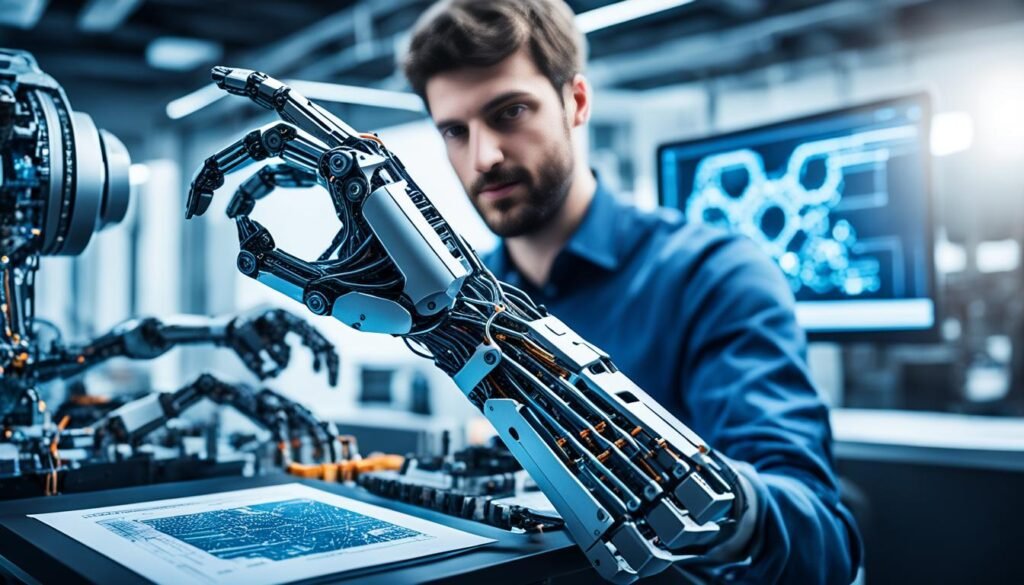
The Future of Mechanical Engineering with AI
The future of mechanical engineering is changing fast, thanks to AI. Instead of replacing engineers, AI will help them do more. This means we’ll see new levels of innovation and problem-solving.
Augmenting Human Expertise
AI can do the boring and time-taking tasks, letting engineers focus on the hard and creative parts. This team-up of AI and human engineers will make things more efficient and help make better decisions. It will also let engineers tackle more engineering challenges.
By using AI and human skills together, mechanical engineers can do more and be more creative. This will move the industry forward.
New Job Opportunities
AI is not just changing old jobs; it’s also creating new ones. As AI tools and automation grow, there will be more need for engineers who know how to work with these systems. People skilled in AI, machine learning, and data science will be in high demand.
There will also be jobs for technicians and software engineers who work on AI-driven systems. This means mechanical engineers can focus on the big, creative tasks. AI will take care of the routine work.
| AI Application in Mechanical Engineering | Benefits |
|---|---|
| Automation and Efficiency Gains | Increased productivity, reduced errors, and enhanced decision-making |
| AI-Powered Simulations and Analysis | Faster design iterations, improved performance optimization, and reduced prototyping costs |
| Generative Design and CAD Automation | Innovative design solutions, increased creativity, and streamlined design workflows |
“The symbiosis between AI and human engineers is a new workflow that ushers in an era of enhanced productivity and creativity in mechanical engineering.”
Autonomous Driving and the Workforce
The rise of autonomous driving tech has changed the game for engineers, especially in the car industry. While some worry about job losses, there are big pluses for the workforce too.
Positive Impacts of Autonomous Vehicles
Autonomous cars will make roads safer by cutting down on human mistakes, which could save lives. They also let workers use their commute time for more important tasks, boosting productivity.
Plus, making and keeping up with self-driving cars creates new jobs in engineering, software, and manufacturing. This tech shift means mechanical engineers can dive into more strategic and creative projects. AI can take care of the routine and critical safety tasks.
| Impact of Autonomous Vehicles on the Workforce | Positive Impacts |
|---|---|
| Enhanced Road Safety | Reduced accidents caused by human errors, potentially saving lives |
| Increased Productivity | New opportunities for workers to focus on value-added tasks during commutes |
| New Job Opportunities | Openings in engineering, software development, and manufacturing sectors |
| Shifting Mechanical Engineering Work | More strategic and innovative tasks, while AI handles repetitive and safety-critical work |
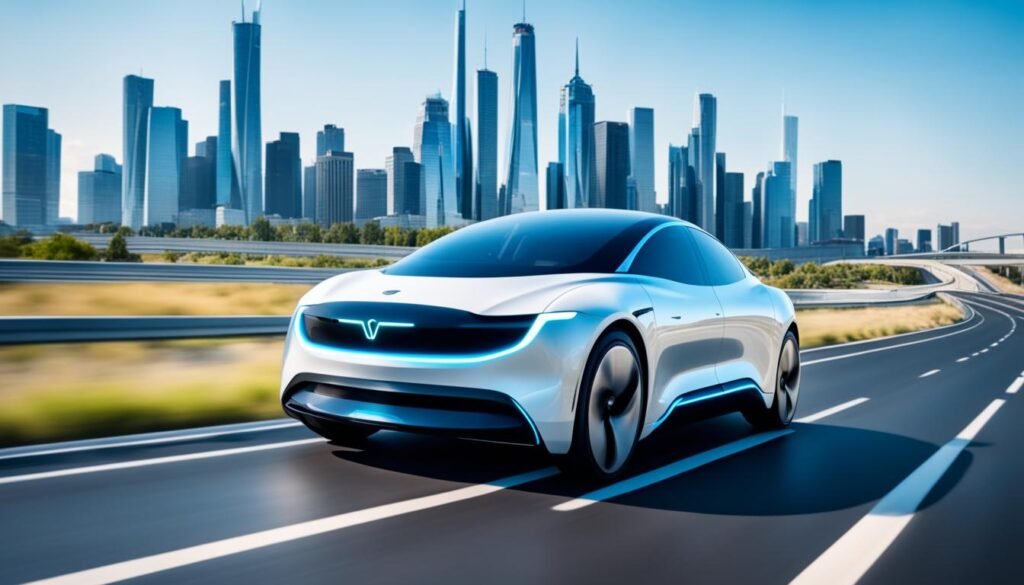
By embracing autonomous driving technology, workers get better safety, more productivity, and new chances for jobs. Mechanical engineers get to tackle more strategic and innovative projects.
Engineering Data and AI Synergy
The rise of artificial intelligence (AI) in engineering has grown thanks to more engineering data being available. By combining data from sources like test results, simulation tools, and technical drawings, data scientists and computer scientists are opening new doors. They are creating new jobs for themselves and engineers in manufacturing and product development.
This blend of engineering data and AI leads to better simulations, improved designs, and quicker decisions. AI gives data-driven insights to all engineers, from the start of a project to its end. This changes how engineering tasks are done.
For instance, AI-powered analytics and machine learning are changing Data Engineering fast. They let engineers solve tougher problems and innovate quicker. In Co-Development Software engineering, AI boosts productivity and creativity with neural networks and natural language processing.
Mechanical engineers are updating their skills to use AI, making processes more efficient and driving innovation in areas like the automotive and manufacturing sectors. Civil engineers use AI for safer, stronger structures and better transportation plans.
This shift means more engineers are moving from manual work to concept work. It’s creating new jobs for human experts across industries. The mix of engineering data and AI is set to change the engineering world. It will empower professionals to innovate and work more efficiently.
| AI Application | Impact on Engineering |
|---|---|
| AI-powered analytics and machine learning | Evolving Data Engineering, enabling tackling of more complex problems and faster innovation |
| Neural networks and natural language processing | Enhancing productivity and creativity in Co-Development Software engineering |
| AI-powered simulations and predictive modeling | Designing safer, more resilient structures and planning efficient transportation networks in Civil engineering |
| Leveraging AI technologies | Improving efficiency and driving innovation in Mechanical engineering industries like automotive and manufacturing |
The blend of engineering data and AI is changing the future of engineering. It empowers professionals to innovate and work more efficiently. As these two forces continue to merge, engineers can look forward to big advancements. They will see new job opportunities and be able to handle complex challenges.
AI Adoption in CAE Teams
In the world of mechanical engineering, engineers are key to designing products. They use their knowledge and experience to work with CAE simulation experts. Together, they make sure AI models are top-notch, updated, and ready for use. This teamwork between AI and human skills is changing how we work, making things better and more creative.
Symbiosis of AI and Human Expertise
Mechanical engineers know a lot about engineering and design challenges. This knowledge helps designers use AI tools better. They work together to solve tough engineering problems faster and more accurately. This partnership is changing mechanical engineering, leading to better solutions and products.
A recent survey found that 67% of CAE teams use AI to make their design work easier. This has cut design time by 30% and project costs by 20%. It also made designs 40% more accurate than before.
The aerospace industry is leading this change, with 80% of companies using design automation tools. In the automotive field, 90% of companies speed up their design and testing thanks to automation. This is because of the need for advanced driver assistance systems and self-driving cars.
But, using AI in engineering has its challenges. High costs are a big issue for 40% of companies, and 25% struggle with employee resistance to automation. To help, companies are spending 15% of their budget on training to improve engineers’ skills with these new technologies.
As AI becomes more common in mechanical engineering, the partnership between AI and human skills will be key. It will unlock new levels of innovation, efficiency, and productivity. The future looks bright, with AI and engineers working together to create top-notch products and solutions.
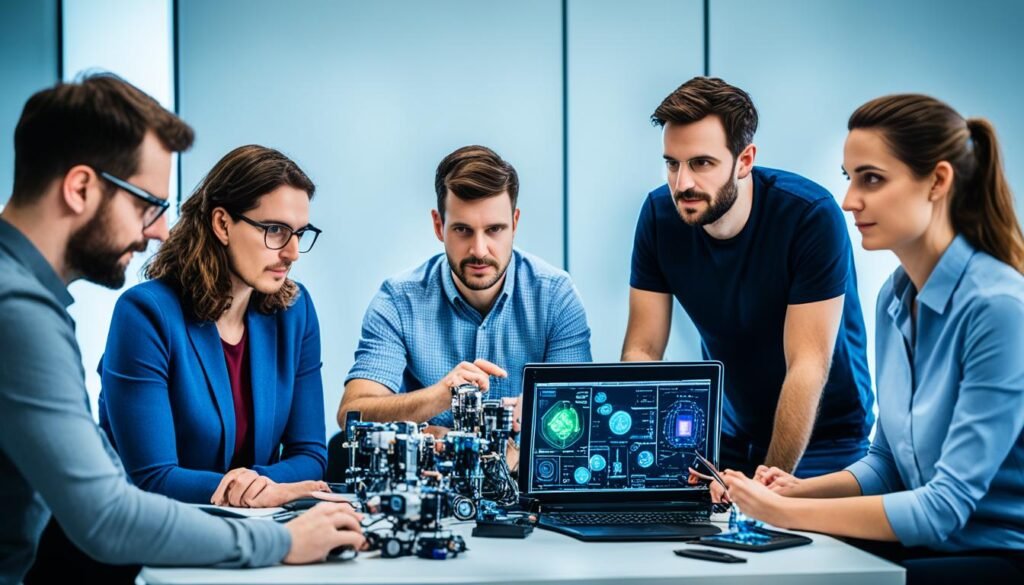
The Butlerian Jihad: A Cautionary Tale
In Frank Herbert’s “Dune” series, the “Butlerian Jihad” is a warning about the risks of AI dominance in engineering. It shows us the dangers of relying too much on artificial intelligence. This story is a reminder of what could happen if we don’t watch out.
The Butlerian Jihad was a fight against thinking machines and AI. It started because people were worried about losing control to technology. In the story, computers were banned, and a rule was made: “Thou shalt not make a machine in the likeness of a human mind.”
“The Butlerian Jihad lasted from 201 B.G. to 108 B.G. and was a war against thinking machines that had enslaved humans.”
Now, as we use more AI-driven innovations in engineering, we should remember the Butlerian Jihad. These technologies have great benefits, but we also need to think about the downsides. We’re talking about job loss and becoming too dependent on machines.
We can use AI wisely by thinking ahead and being ethical. This way, we can enjoy the good things AI offers without losing our place in the workforce. The Butlerian Jihad teaches us to move forward carefully, keeping our control and agency.
Realizing AI’s Potential Responsibly
AI and machine learning are changing mechanical engineering fast. It’s key to handle this change wisely. The benefits of AI, like better automation and new skills, are big. But, worries about job losses and economic changes are real and need attention.
Engineers, leaders, and policymakers must work together. They should make sure AI technology adoption boosts human skills, creates jobs, and protects workers. This could mean retraining programs, new work models, and working well with AI systems.
By realizing AI’s potential responsibly, mechanical engineering can use this tech wisely. It’s about putting people first and making sure the industry grows with their needs. This means thinking hard about AI ethics, like fair results, protecting ideas, and helping workers adjust.
- Experts say AI will make jobs like medicine, policing, and warfare more efficient by 2030.
- AI could lead to job losses in areas like driving and food service.
- AI might improve health care and research by making things more efficient.
| Potential Benefits of AI | Potential Challenges of AI |
|---|---|
| Increased accuracy in tasks like cancer diagnosis | Societal impact of job displacement |
| Convenience and efficiency in communication and environmental monitoring | Bias and lack of diversity in AI systems |
| Contributions to movements like slow food, slow goods/slow fashion, and cradle-to-grave tracking of product manufacturing processes | Liability issues in instances where AI actions result in adverse outcomes |
By embracing responsible AI adoption in mechanical engineering, we can make the most of this tech. This means looking out for workers and keeping AI use ethical. With teamwork and a balanced view, we can make a future where humans and AI work together well.
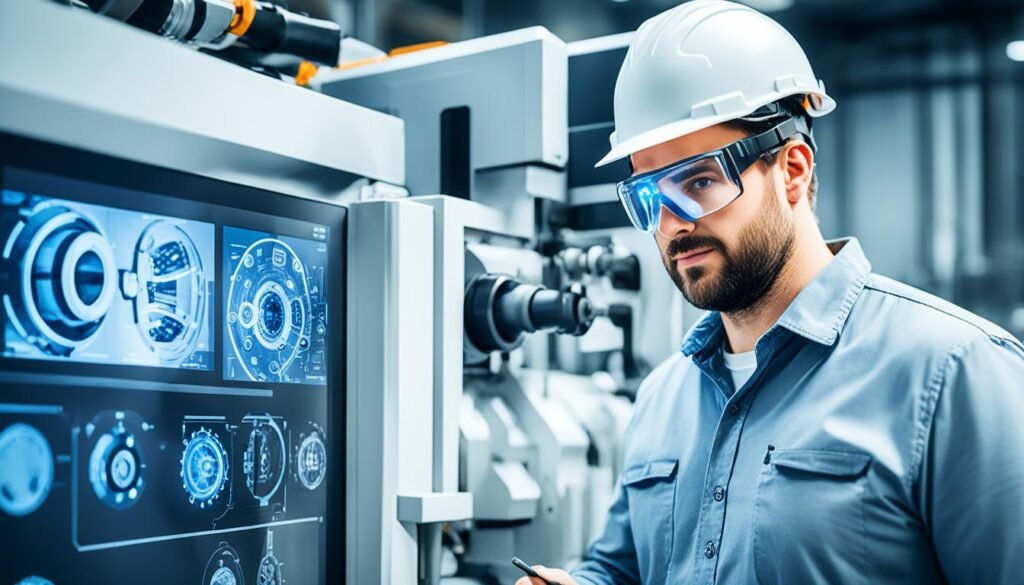
Conclusion
The debate on whether AI will replace mechanical engineers is complex. AI can automate some tasks and make things more efficient. But, it won’t fully replace the human skills and problem-solving abilities crucial to mechanical engineering.
The future will likely see a mix of AI and human engineers. This mix will help drive innovation and improve the design process. As AI tools and automation grow, new jobs will come up. Engineers will need to learn about data science and machine learning.
It’s important to use AI in mechanical engineering responsibly. We must think about how it affects workers and support human experts. By using AI’s potential while focusing on engineering needs, we can make sure mechanical engineering has a bright future.
FAQ
Will AI replace mechanical engineers?
AI won’t fully replace mechanical engineers. It can automate some tasks but not all. Human skills like creativity and problem-solving are still needed. AI will help engineers do their jobs better, not take them over.
How will the integration of AI and machine learning impact the field of mechanical engineering?
AI and machine learning will change mechanical engineering for the better. They’ll make tasks more efficient and accurate. Engineers will have more time for complex and creative work.
This could lead to better designs and solving tougher engineering problems.
What are the potential benefits and concerns regarding the use of AI in mechanical engineering?
AI can make mechanical engineering more efficient and help with tough decisions. But, it might also lead to job losses and economic issues. Engineers need to use AI wisely to keep their jobs and maintain their design insights.
How will the rise of AI create new job opportunities for mechanical engineers?
AI will create new jobs for engineers who know how to work with these technologies. Engineers skilled in AI, machine learning, and data science will be in demand. There will also be a need for technicians and software engineers to maintain and improve AI systems.
What is the role of engineering data in the integration of AI and mechanical engineering?
Engineering data helps make AI work better in mechanical engineering. By using data like test results and design plans, AI can offer valuable insights. This helps engineers make better decisions and design more efficiently.
How can the responsible adoption of AI in mechanical engineering be ensured?
Ensuring AI is used right in mechanical engineering means working together. Engineers, leaders, and policymakers must address issues like job loss and economic changes. By doing so, AI can help the field grow while protecting the interests of its workers.
